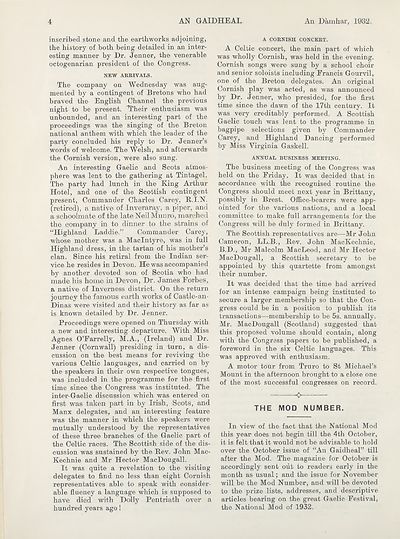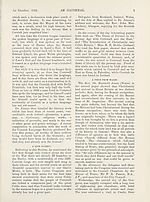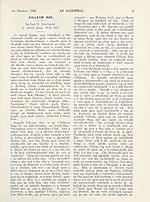Download files
Complete book:
Individual page:
Thumbnail gallery: Grid view | List view

4
AN GAIDHEAL
An Damhar, 1932.
inscribed stone and the earthworks adjoining,
the history of both being detailed in an inter¬
esting manner by Dr. Jenner, the venerable
octogenarian president of the Congress.
NEW ARKIVALS.
The company on Wednesday was aug¬
mented by a contingent of Bretons who had
braved the English Channel the previous
night to be present. Their enthusiasm was
unbounded, and an interesting part of the
proceedings was the singing of the Breton
national anthem with which the leader of the
party concluded his reply to Dr. Jenner’s
words of welcome. The Welsh, and afterwards
the Cornish version, were also sung.
An interesting Gaelic and Scots atmos¬
phere was lent to the gathering at Tintagel.
The party had lunch in the King Arthur
Hotel, and one of the Scottish contingent
present, Commander Charles Carey, B.I.N.
(retired), a native of Inveraray, a piper, and
a schoolmate of the late NeilMunro, marched
the company in to dinner to the strains of
“Highland Laddie.” Commander Carey,
whose mother was a MacIntyre, was in full
Highland dress, in the tartan of his mother’s
clan. Since his retiral from the Indian ser¬
vice he resides in Devon. He was accompanied
by another devoted son of Scotia who had
made his home in Devon, Dr. James Forbes,
a native of Inverness district. On the return
journey the famous earth works of Castle-an-
Dinas were visited and their history as far as
is known detailed by Dr. Jenner.
Proceedings were opened on Thursday with
a new and interesting departure. With Miss
Agnes O’Farrelly, M.A., (Ireland) and Dr.
Jenner (Cornwall) presiding in turn, a dis¬
cussion on the best means for reviving the
various Celtic languages, and carried on by
the speakers in their own respective tongues,
was included in the programme for the first
time since the Congress was instituted. The
inter-Gaelic discussion -which was entered on
first was taken part in by Irish, Scots, and
Manx delegates, and an interesting feature
was the manner in which the speakers were
mutually understood by the representatives
of these three branches of the Gaelic part of
the Celtic races. The Scottish side of the dis¬
cussion was sustained by the Rev. John Mac-
Kechnie and Mr Hector MacDougall.
It was quite a revelation to the visiting
delegates to find no less than eight Cornish
representatives able to speak with consider¬
able fluency a language which is supposed to
have died with Dolly Pentriath over a
hundred years ago!
A CORNISH CONCERT.
A Celtic concert, the main part of which
was wholly Cornish, was held in the evening.
Cornish songs were sung by a school choir
and senior soloists including Francis Gourvil,
one of the Breton delegates. An original
Cornish play was acted, as was announced
by Dr. Jenner, who presided, for the first
time since the dawn of the 17th century. It
was very creditably performed. A Scottish
Gaelic touch was lent to the programme in
bagpipe selections given by Commander
Carey, and Highland Dancing performed
by Miss Virginia Gaskell.
ANNUAL BUSINESS MEETING.
The business meeting of the Congress was
held on the Friday. It was decided that in
accordance with the recognised routine the
Congress should meet next year in Brittany,
possibly in Brest. Office-bearers were app¬
ointed for the various nations, and a local
committee to make full arrangements for the
Congress will be duly formed in Brittany.
The Scottish representatives are.—Mr John
Cameron, LL.B., Rev. John MacKechnie,
B.D., Mr Malcolm MacLeod, and Mr Hector
MacDougall, a Scottish secretary to be
appointed by this quartette from amongst
their number.
It was decided that the time bad arrived
for an intense campaign being instituted to
secure a larger membership so that the Con¬
gress could be in a position to publish its
transactions—membership to be 5s. annually.
Mr. MacDougall (Scotland) suggested that
this proposed volume should contain, along
with the Congress papers to be published, a
foreword in the six Celtic languages. This
was approved with enthusiasm.
A motor tour from Truro to St Michael’s
Mount in the afternoon brought to a close one
of the most successful congresses on record.
<>
THE MOD NUMBER.
In view of the fact that the National Mod
this year does not begin till the 4th October,
it is felt that it would not be advisable to hold
over the October issue of “An Gaidheal” till
after the Mod. The magazine for October is
accordingly sent out to readers early in the
month as usual; and the issue for November
will be the Mod Number, and will be devoted
to the prize lists, addresses, and descriptive
articles bearing on the great Gaelic Festival,
the National Mod of 1932.
AN GAIDHEAL
An Damhar, 1932.
inscribed stone and the earthworks adjoining,
the history of both being detailed in an inter¬
esting manner by Dr. Jenner, the venerable
octogenarian president of the Congress.
NEW ARKIVALS.
The company on Wednesday was aug¬
mented by a contingent of Bretons who had
braved the English Channel the previous
night to be present. Their enthusiasm was
unbounded, and an interesting part of the
proceedings was the singing of the Breton
national anthem with which the leader of the
party concluded his reply to Dr. Jenner’s
words of welcome. The Welsh, and afterwards
the Cornish version, were also sung.
An interesting Gaelic and Scots atmos¬
phere was lent to the gathering at Tintagel.
The party had lunch in the King Arthur
Hotel, and one of the Scottish contingent
present, Commander Charles Carey, B.I.N.
(retired), a native of Inveraray, a piper, and
a schoolmate of the late NeilMunro, marched
the company in to dinner to the strains of
“Highland Laddie.” Commander Carey,
whose mother was a MacIntyre, was in full
Highland dress, in the tartan of his mother’s
clan. Since his retiral from the Indian ser¬
vice he resides in Devon. He was accompanied
by another devoted son of Scotia who had
made his home in Devon, Dr. James Forbes,
a native of Inverness district. On the return
journey the famous earth works of Castle-an-
Dinas were visited and their history as far as
is known detailed by Dr. Jenner.
Proceedings were opened on Thursday with
a new and interesting departure. With Miss
Agnes O’Farrelly, M.A., (Ireland) and Dr.
Jenner (Cornwall) presiding in turn, a dis¬
cussion on the best means for reviving the
various Celtic languages, and carried on by
the speakers in their own respective tongues,
was included in the programme for the first
time since the Congress was instituted. The
inter-Gaelic discussion -which was entered on
first was taken part in by Irish, Scots, and
Manx delegates, and an interesting feature
was the manner in which the speakers were
mutually understood by the representatives
of these three branches of the Gaelic part of
the Celtic races. The Scottish side of the dis¬
cussion was sustained by the Rev. John Mac-
Kechnie and Mr Hector MacDougall.
It was quite a revelation to the visiting
delegates to find no less than eight Cornish
representatives able to speak with consider¬
able fluency a language which is supposed to
have died with Dolly Pentriath over a
hundred years ago!
A CORNISH CONCERT.
A Celtic concert, the main part of which
was wholly Cornish, was held in the evening.
Cornish songs were sung by a school choir
and senior soloists including Francis Gourvil,
one of the Breton delegates. An original
Cornish play was acted, as was announced
by Dr. Jenner, who presided, for the first
time since the dawn of the 17th century. It
was very creditably performed. A Scottish
Gaelic touch was lent to the programme in
bagpipe selections given by Commander
Carey, and Highland Dancing performed
by Miss Virginia Gaskell.
ANNUAL BUSINESS MEETING.
The business meeting of the Congress was
held on the Friday. It was decided that in
accordance with the recognised routine the
Congress should meet next year in Brittany,
possibly in Brest. Office-bearers were app¬
ointed for the various nations, and a local
committee to make full arrangements for the
Congress will be duly formed in Brittany.
The Scottish representatives are.—Mr John
Cameron, LL.B., Rev. John MacKechnie,
B.D., Mr Malcolm MacLeod, and Mr Hector
MacDougall, a Scottish secretary to be
appointed by this quartette from amongst
their number.
It was decided that the time bad arrived
for an intense campaign being instituted to
secure a larger membership so that the Con¬
gress could be in a position to publish its
transactions—membership to be 5s. annually.
Mr. MacDougall (Scotland) suggested that
this proposed volume should contain, along
with the Congress papers to be published, a
foreword in the six Celtic languages. This
was approved with enthusiasm.
A motor tour from Truro to St Michael’s
Mount in the afternoon brought to a close one
of the most successful congresses on record.
<>
THE MOD NUMBER.
In view of the fact that the National Mod
this year does not begin till the 4th October,
it is felt that it would not be advisable to hold
over the October issue of “An Gaidheal” till
after the Mod. The magazine for October is
accordingly sent out to readers early in the
month as usual; and the issue for November
will be the Mod Number, and will be devoted
to the prize lists, addresses, and descriptive
articles bearing on the great Gaelic Festival,
the National Mod of 1932.
Set display mode to:
![]() Universal Viewer |
Universal Viewer | ![]() Mirador |
Large image | Transcription
Mirador |
Large image | Transcription
| An Comunn Gàidhealach > An Comunn Gàidhealach Publications > Gaidheal > Volume 28, October 1932--September 1933 > (12) Page 4 |
|---|
| Permanent URL | https://digital.nls.uk/127131156 |
|---|
| Description | This contains items published by An Comunn, which are not specifically Mòd-related. It includes journals, annual reports and corporate documents, policy statements, educational resources and published plays and literature. It is arranged alphabetically by title. |
|---|
| Description | A collection of over 400 items published by An Comunn Gàidhealach, the organisation which promotes Gaelic language and culture and organises the Royal National Mòd. Dating from 1891 up to the present day, the collection includes journals and newspapers, annual reports, educational materials, national Mòd programmes, published Mòd literature and music. |
|---|---|
| Additional NLS resources: |
|

